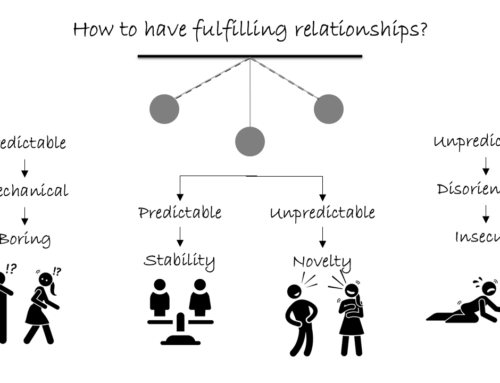Does devotion automatically lead to ethical growth? – Devotion automatically leads to ethical growth — we may support this claim by quoting Srimad-Bhagavatam verse (05.18.12): devotees manifest all godly qualities
But our claim will sooner or later be challenged by experience. We may find ourselves succumbing to unethical behavior, especially of the kind we may have been habituated to in our pre-devotional life. Even if we conceal or deny such lapses in ourselves, we may find other devotees acting unethically. Even if we try to explain away such actions, sometimes those actions may be so frequent or deviant as to be impossible to rationalize.
How can we reconcile such experiences with the above Bhagavatam verse? By considering the opposite direction of causation. That is, rather than presuming we have virtues because we are devotees, we can consider that if we aren’t manifesting virtues, maybe we aren’t actually devotees. Pertinently, the Bhagavad-gita (12.13-19) lists several virtues that ornament devotion: virtues such as cordiality in dealing with diverse people and calmness in facing emotional extremes (12.15).
Why might virtues not manifest in a devotee? Because they may still be at a preliminary devotional level; devotion’s purificatory potency will manifest in them over time. Or their devotional practices may be superficial or perfunctory, thus delaying the removal of the impurities that impel unethical behavior.
By reversing the causal chain, we can see ethics as parameters for assessing our devotional growth. Won’t devotional sentiments be better parameters? Not necessarily. In our present stage as devotee-seekers, devotional sentiments can be fickle and fleeting. Better to focus on the steady formation and reformation of ethical character as indicative of our devotional growth.
One-sentence summary:
Don’t presume the presence of ethics due to our practice of devotion; check the presence of ethics to assess the quality of our practice of devotion.
Think it over:
- Have any experiences challenged the assertion that devotional growth automatically leads to ethical growth?
- How can we make sense of such experiences?
- Which parameters are reliable in assessing devotional growth and which aren’t? Why?
***
12.15: He by whom no one is put into difficulty and who is not disturbed by anyone, who is equipoised in happiness and distress, fear and anxiety, is very dear to Me.
To know more about this verse, please click on the image



Leave A Comment